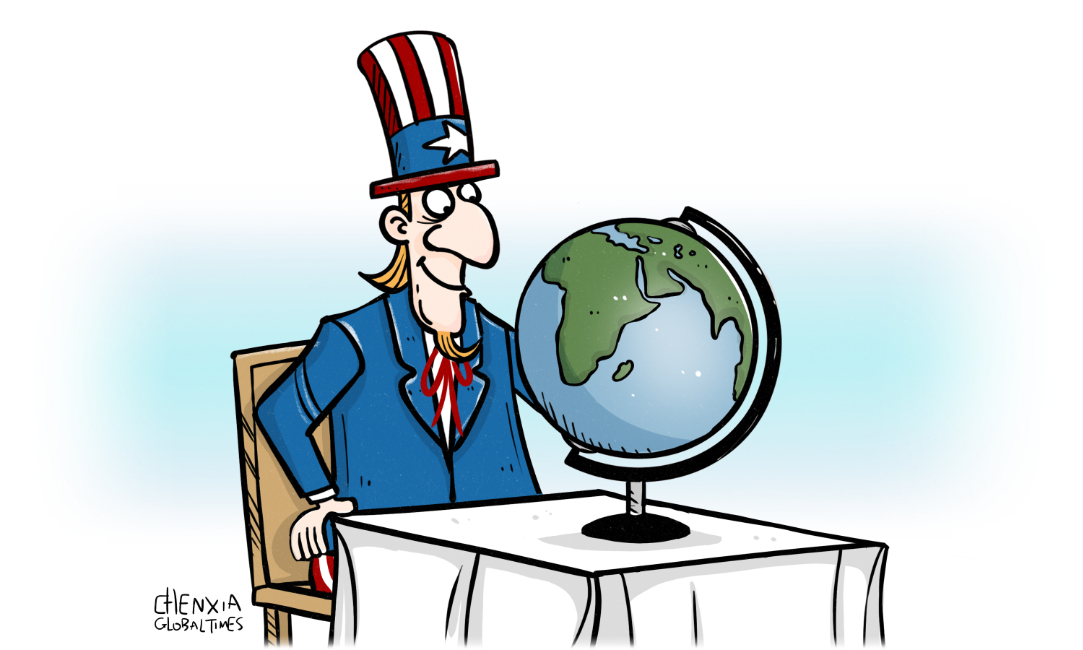
Illustration: Chen Xia/GT
Recently,
mk during Kenyan President William Ruto's visit to Washington, US President Joe Biden pledged to designate Kenya as the country's first "major non-NATO ally" in sub-Saharan Africa. The move underscores America's "new understanding" of Africa and the strategic implications of intensifying competition for influence by using regional powers.
First, Kenya can strengthen the US' military presence in East Africa. Although Biden announced a new version of the US Africa Strategy and held the US-Africa Leaders Summit, he has yet to visit Africa as president or fulfilled his promise of supporting the African continent made at the summit.
By welcoming Ruto's visit, the Biden administration aims to repair Washington's neglectful handling of African issues. Ruto's visit not only marked the sixth state visit received by the Biden administration but also made him the first African head of state to make an official state visit to the US since 2008. Biden personally welcomed Ruto at the south portico of the White House, and a grand state banquet attended by about 500 guests was held after the talks, a ceremony typically reserved for close allies of the US.
Moreover, designating Kenya as a major non-NATO ally of the US aims to strengthen offshore control over the African continent. Currently, a total of 18 countries, including Israel, Brazil, and the Philippines, are designated by the US as non-NATO allies, all of which are regional "pivot" countries.
While there is no mutual defense agreement, this designation will deliver additional US assistance to Kenya, including a new cooperation program worth approximately $7 million aimed at helping the Kenyan National Police Service. This move, under the guise of counterterrorism, actually serves to strengthen US military influence in East Africa and to allow it to play a leading role in regional security agenda.
Second, Kenya can help maintain the division of power between the US and Europe in Africa. The current US Africa policy largely continues the ideological competition mindset from the Cold War era, with the basic consensus of the US respecting and maintaining European allies' "control" over Africa. This is also a key reason for the setbacks encountered by the Biden administration in West Africa.
To show respect to its European allies, the US based its Africa Command in Europe, and only left approximately 1,000 America troops in Nigeria in the name of counterterrorism.
However, a coup last year changed the situation. After expelling French troops and ambassadors, Nigeria demanded US soldiers leave the country and the US has announced to withdraw all military personnel before September. Against this backdrop, Kenya is the "best choice" as the US tries to maintain a balance between maintaining allies and ideological competition.
Biden hopes to strengthen the military partnership with Kenya to reverse the troubled Africa policy and expects Kenya to become an agent of the US and its European allies, assisting in resolving conflicts on the African continent and other regions.
The Ruto government also appears to be "cooperative," not only closely following the US lead in multilateral voting, but also actively participating in US-backed overseas peacekeeping mission and sending troops to Haiti to help quell the gang violence there.
Furthermore, the move could intensify competition with China for influence in the region. With one billion people and abundant key mineral resources, Africa is an important link in the global value chain. The US used to view Africa only as an arena of ideological competition, without really examining its own strategic values. In recent years, as China-Africa relations continue to escalate, the US has stepped up its presence in Africa, but Africa's importance is not high. However, a Gallup poll last year showed that the US has fallen behind China in soft power rankings in Africa.
The Western media concluded that historically, the West has seen Africa as a problem that needs to be solved, while China, Turkey and other Arab countries see Africa as an opportunity to seize. This type of engagement is popular because Africa really feels being taken seriously.
It is hard for the competition-driven US Africa strategy to do so. For Kenya, the US has pledged substantial financial support to help alleviate its debt burden and has promised to build a parallel highway along the Chinese-built Mombasa-Nairobi Standard Gauge Railway. However, it remains uncertain as to whether these commitments can truly be implemented.
Including Kenya in the quasi-security alliance not only underscores America's emphasis on Africa as the "continent of the future" but also reflects its unease about the region. While the US may currently need Africa's support in dealing with many global issues, like the Russia-Ukraine conflict and the Palestine-Israel conflict, it is hard to fully transform Kenya into a de facto voice for its interests in Africa.
The author is professor with School ofInternational Relations and Diplomacy, Beijing Foreign StudiesUniversity. [email protected]

